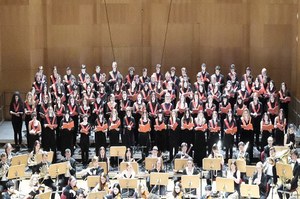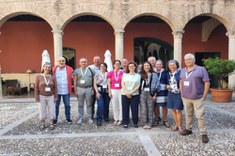A new spring of music with MusicAteneo 2024

MusicAteneo 2024, the international festival of orchestras and choirs organised by Collegium Musicum that brings music to life in Bologna every spring will open on Saturday, 4 May, with a concert by the University of Lisbon Choir. This year, it features five free-entry events from 4 May to 16 June 2024.
Under the direction of Eduardo Martins, the University of Lisbon Choir will offer an overview of Portuguese music blending tradition with contemporary sounds, featuring a repertoire composed of three parts: oral tradition of ancestors, poetic/classical literature, and texts from the "Carnation Revolution," which celebrates its 50th anniversary this year. Hosting the event will be the Collegium Musicum Chamber Choir directed by Nicola Carli, who will perform selected pieces from French choral music of the 20th century by Duruflé and Ropartz.
Next, on Tuesday, 7 May, the Collegium Musicum Orchestra, conducted by Alissia Venier, will present an exciting repertoire including Schubert's Symphony No. 6 and Beethoven's Triple Concerto. The piece, rarely performed in symphonic programs, will showcase the talents of three soloists: Pietro Bolognini on violin, Antonio Silvestro Salvati on cello, and Isabella Ricci on piano.
The following two events will be entirely dedicated to choral music. On Sunday, 19 May, the Collegium Musicum Choir and Chamber Choir will take the audience through a musical journey with responsories for Holy Week by various composers, including Alessandro Scarlatti. Culminating a two-day choral masterclass, the concert will be conducted by Marco Berrini, one of the most active choral conductors in Italy and abroad. On Thursday, 6 June, the University Choir of Ferrara will perform a diverse and interesting programme, introduced by a musical welcome from the Collegium Musicum Choir.
As tradition dictates, the final concert on Sunday, 16 June, will feature the Collegium Musicum Orchestra and Choir performing together, conducted by Enrico Lombardi. The evening will begin with a Beethoven overture, followed by the performance of Hummel's Mass No. 3. Hummel, who lived and composed during the late 18th and early 19 century, was renowned for his instrumental music, particularly his virtuosic piano concertos. His sacred music production was concentrated during his time at the Esterházy court in Eisenstadt. Despite being esteemed and published in Vienna and London during his time, his sacred compositions are rarely heard today, making this concert particularly special.






